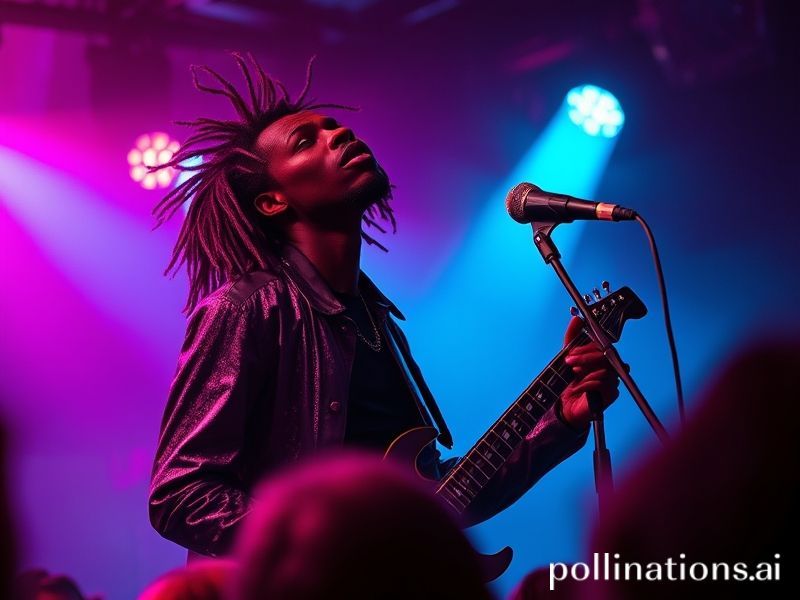Yves Tumor: The Post-National Pop Star Soundtracking Our Borderless Breakdown
Yves Tumor and the Quiet Collapse of Borders
by “Marco Vélez, International Cultural Correspondent, currently hiding in a Lisbon hostel that still smells of 2019 optimism”
When the first distorted guitar loop of Yves Tumor’s latest single crackled out of a weather-beaten radio in Dakar last month, a Senegalese taxi driver told me it sounded “like America finally apologizing—badly, through feedback.” Halfway across the planet, a Berlin club kid Shazammed the same track, mistaking it for an unreleased Prince demo smuggled out of Paisley Park in a diplomatic pouch. In both cases, nobody bothered asking where Yves Tumor was actually from, because that’s the point: origin stories are now optional extras, like gluten on an airline menu.
Born Sean Bowie in Miami, incubated in Knoxville, polished in Los Angeles, and currently orbiting somewhere above the Schengen Area, Yves Tumor has become a one-person multinational zone. Visas expire, governments change, but the music keeps slipping through customs, declaring only one item: mood. The global touring circuit—once a polite exchange of soft power and hard currency—has turned into a nonstop red-eye where every departure lounge is the same shade of existential beige. Tumor simply soundtracks the fluorescent dread better than most.
The international implications are subtle but ruthless. While trade negotiators haggle over microchips and frozen chicken, Tumor’s label is busy laundering serotonin across streaming platforms in 92 territories. Each algorithmic push is a miniature trade route: a syncopated bassline enters Chile through Spotify’s “Pollen” playlist, exits six weeks later as a ringtone on a bus in Jakarta. The WTO never saw it coming, and frankly neither did the artist; Tumor claims they just “make weird soul music for people who hate waiting in line.” That demographic appears to span every time zone.
Of course, no borderless phenomenon escapes the tax man. France recently slapped a 1.75% levy on foreign streaming revenue, prompting Tumor’s European promoter to grumble that “even panic is now subject to VAT.” Meanwhile, Japanese collectors pay import tariffs on limited-run vinyl the way Renaissance princes once tithed for relics. Somewhere a customs officer in Narita is holding up a blood-splatter marble LP wondering if it counts as cultural goods or contraband emotion. Spoiler: it’s both.
Critics love to call this post-genre, but that’s just marketing Latin for “we give up.” What’s really happening is sonic money-laundering: funk riffs laundered through industrial noise, then rinsed in gospel until they emerge clean enough for luxury-car commercials in Dubai. The Arab world’s youth, still processing a decade of failed revolutions, now blast “Gospel for a New Century” at 3 a.m. from rented Lamborghinis, half-ironic, half-desperate. The song’s brass section sounds like a coup that decided to throw a party instead. Nobody knows whether to dance or duck.
In Lagos, Afrobeats producers sample Tumor’s drum breaks and resell them to Atlanta trap producers, who flip them back across the Atlantic before breakfast. The circle completes itself somewhere over the Mid-Atlantic Ridge, Atlantis bobbing along to a hi-hat pattern it never asked for. Meanwhile, Spotify counts the micro-pennies and congratulates itself on “building bridges,” blissfully unaware the bridges are on fire and everyone’s taking selfies in the glow.
The broader significance? We’ve reached the stage where national identity is just another plugin—toggle between Memphis soul and Rotterdam gabber with a swipe. Yves Tumor doesn’t represent any flag; they represent the airport corridor between gates. If that sounds bleak, consider the alternative: the same corridor without the soundtrack. Silence, after all, is the only border still strictly enforced, usually by people who believe guitars are weapons of mass distraction.
So the next time you’re crammed into economy, half-listening to “Kerosene!” at 30,000 feet, remember you’re participating in the softest form of geopolitics available: emotional contraband disguised as entertainment. Customs forms will never ask if you’re importing existential dread in 4/4 time. They should. The duty alone might solve climate change.







